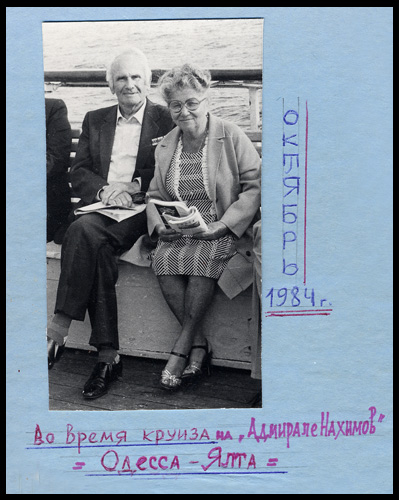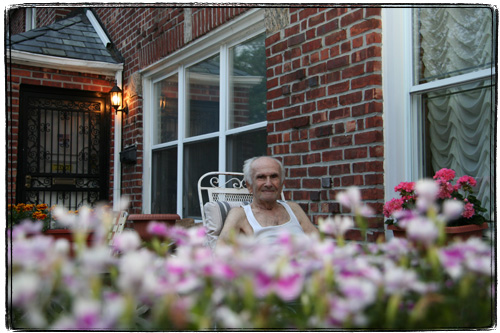
My paternal grandmother, the matriarch of the family, a mechanical engineer and a workaholic, was the main driving force behind our move to America. She woke up at 5 am every day to prepare a meal for the family and start cleaning. She loved America, but did not live long enough to enjoy her life here. Her luck ran out a several years after my family arrived in the US — pancreatic cancer destroyed her body. The surgeons operated, but could not help her.
My grandfather, on the other hand was a bit luckier. He also had an operation in the US – a quadruple bypass, which fixed his heart that was weakened by several small heart attacks. In all likelihood, if he did not immigrate, his heart would have given out earlier, as these operations were not widely available in Ukraine.
Gramps lived an extraordinary life, squeaking by on his luck more than once. The picture of him and my grandma you see above is from their vacation on a Soviet cruise ship. I took a scan from a page of my personal photo album that he lovingly created for me, complete with his accurately printed titles. “October 1984, Cruise on ‘Admiral Nakhimov’, Odessa-Yalta” the caption reads. In August 1986, Admiral Nakhimov became the Soviet Titanic, colliding with cargo ship Pyotr Vasyev, mostly though gross incompetence of and dereliction of duty by the two captains.
Having survived Stalin’s purges was mostly pure luck for my grandparents. Having relatives in the USA actually tipped the odds in the wrong direction. My grandparents did have a chance to emigrate in the pre-war wave. One of my grandpa’s friends tried to talk him into going to America and starting a construction business. Good construction engineers like you are hard to find there, he said. My grandma did not want to go at that time, leaving their elderly parents behind. I remember seeing a letter from my grandpa’s friend, who actually started a construction business in the US and struck it rich. The zip code on the letter stuck in my mind for some reason back then, and now I know what it meant — it was 90210. In any case, I think the major reason why my grandfather did not get arrested adn “disappeared” is his easygoing personality. He was a very gentle person, with a small circle of good friends and absolutely no enemies. That, and his luck.
My grandfather had some luck in WWII as well. Very early on in the war a few of his egghead friends called on him to volunteer to a newly formed and somewhat secret division. He spent the war very close to the hottest front points, but not actually in them. He did not shoot or got shot at. In fact, he was handling lots and lots of paperwork. That paperwork was generated by strange-looking cars with antennas, egg-headed mathematicians and grandpa’s friends, who were fluent in several languages. I always knew my grandfather as an extremely meticulous person, especially about paperwork. This quality is very important in the business of code breaking as well as in the construction business.
After the war gramps was poor as a churchmouse. His wartime spoils were limited to the fork and the polishing cloth that I wrote about earlier. To fix their finances my grandparents headed to the boom island of Sakhalin. Sakhalin is an island right next to Japan that looks like a fish from above. The history of Sakhalin’s population is strange and convoluted. Chinese, Japanese, Ainu, Russians and others co-inhabited it. Japan and Russia fought for complete control of it, and finally, after WWII Soviet Russia won. Japanese were driven out and it became a Soviet frontier, rich in oil and other natural resourses. Engineers were desperately needed, and even within the confines of non-market economy, wages were much higher there. My grandparents made a good living there, sending money back to their parent and saving a lot to start their independent life back in Odessa. My dad, whom they took along, meanwhile, learned to ski and to catch smelts, strange little fish that smell like fresh cucumbers.
Back to Odessa they went, where they continued their careers. They bought a few things with their Sakhalin earnings, such as the nice modern furniture and a color TV that I later enjoyed. There are many buildings in Odessa that were built under the supervision of my grandfather. Later he became a college instructor, and taught architects and builders.
Without ever hearing about another famous Odessan who also happens to share his first name, one Yakov Pokhis better known as Yakov Smirnoff, gramps liked to repeat the famous catchphrase. “What a country! What won’t they think of!” — he used to say when I showed him a gadget or when he read about something in a newspaper or saw something on TV.
Grandfather’s luck ran out at the age of 91. He caught pneumonia. In the hospital, he started to get a little better, but then suddenly coded. His heart probably simply gave out, and the house doctor could not revive him. I talked to that doctor, and it was bad. Decent doctors say “I am sorry for your loss” and not “what is it that you want to know”; they do not mix pronouns, even if they speak broken English. I can only hope that he did everything that he could to save my grandfather.
Here’s literally the last picture I ever took of him (it was earlier this year). My latest digital camera and flash impressed gramps a lot, as it came a long way from the huge camera he and his father used to have (I pointed out that the quality of that old-timey camera was probably better).

As I learned from the eulogy delivered by a rabbi at the funeral, 91 is a special age. In Hebrew letter code 91 means Amen. Aleph = 1, Mem = 40, Nun = 50. Gramps lived a good life, and I am very grateful for having him with us that long. I am also grateful that his death was quick and I hope mostly without suffering. He is finally back with grandma. Amen.